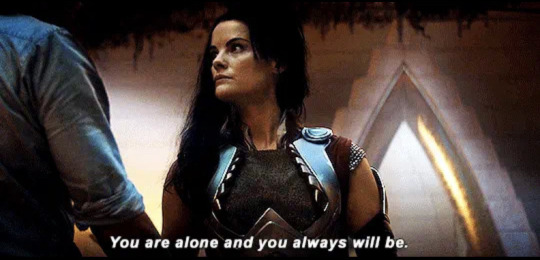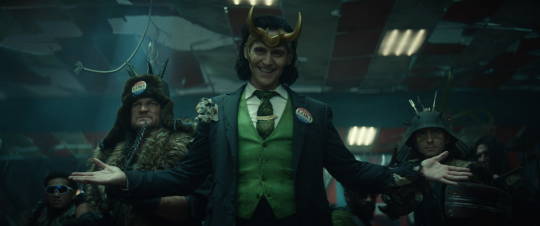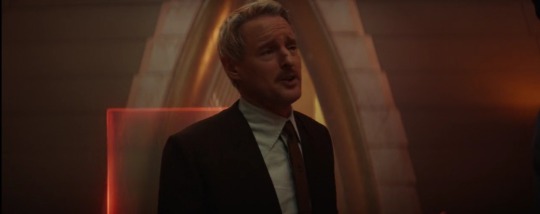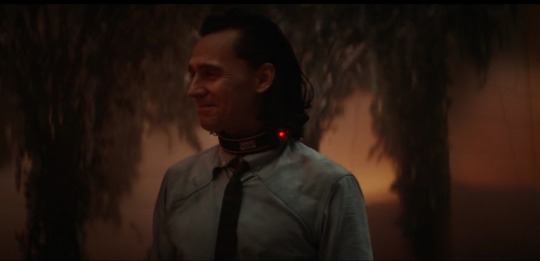#having clear parallels being shown between him and the creature from his first ever statement
Explore tagged Tumblr posts
Photo

For a relatively short exchange, this scene is jam packed with characterization for Loki.
It’s also our first reliable look into what Loki was like before Thor 1. Not as described by others, but first hand and from his own mouth. I think that deserves a closer look, to see what we can learn about Loki and how he thinks.
This scene is significant because it tells us what Loki’s personality is like when he’s not running for his life. It tells us who he was before his trauma and what his core beliefs are underneath those layers of humor and bravado.
Better yet, since he’s alone we can assume that every line in this scene is presumably true, or at least Loki believes it to be true since he has no audience but himself.
The dialogue centers mostly around the statement “You deserve to be alone, and you always will be.” I’m not going to focus too much on the “alone” motif since I already dedicated an entire meta post to it.
What I think is more interesting about this scene is actually the looping, and the stages Loki goes through in trying to deal with it. There’s a lot of really interesting character traits on display in that progression.
Loop 1: A Warm Bath and Glass of Wine
The first loop entails Sif lecturing Loki about cutting her hair, kicking him in the balls, and storming away. Loki kneels on the floor and he gives us this great line:
“A bad memory prison? How quaint. Some punishment. I remember exactly what I did after that. I went and had a nice, hot bath and a glass of wine, and I never thought about it again. Because it was just a bit of fun.”
So we can take this to be Loki’s default reaction to pain and criticism. When put into an unexpected conflict without any forethought or outside influence, this is what he says/does.
1) Downplay the damage/threat. How quaint. 2) Dispel/soothe the emotion. Nice hot bath. 3) Minimize the impact. Never thought about it again. 4) Deflect responsibility. Just a bit of fun.
Keep those in mind as we move forward, since we’ll be using them to make sense of what else Loki says in this scene.
Loops 2 and 3: Okay, Sif, Hang On
This bit is about Loki realizing just how bad his predicament is.
L: Okay. Okay, Sif. Hang on. S: No, you hear this. You deserve to be alone... And I always will be. L: Alright, I get it. Listen. You are a reconstruction of a past event created by the organization that controls all of time. So you need to trust me and you need to help me escape. Yeah? S: Pathetic. (she kicks him again) L: (winces and groans)
As we all would expect from him, Loki’s first impulse is to try and talk his way out of it. What he says to achieve that goal is pretty revealing though. Because he doesn’t try to ease Sif’s upset by apologizing or explaining or offering to magic her hair back.
Any of these would have been more likely to save his nads in the given circumstance, right? The present threat is Sif, and she’s mad about what Loki did to her hair. But Loki doesn’t really see that. Rather, he treats her as a means to an end.
“So you need to trust me and you need to help me escape. Yeah?”
To me, that choice reveals something of a blind spot Loki has to the feelings of others. Even if he doesn’t actively like hurting people, he does prioritize their problems below his, and quite shamelessly. And at least on his first impulse, he doesn’t seem to feel much remorse or empathy for them.

Usually in fanon we attribute this callousness to his trauma. He’s learned that no one can be trusted and no one cares, and so he doesn’t allow himself to care for others.
But between his Loop 1 sentiment of “It was just a bit of fun” for an event which caused real hurt to Sif, and his Loop 2/3 behavior of “you, stop being mad and help ME” I think it’s reasonable to say that selfishness/low empathy are traits Loki possessed pre-trauma.
Loop 4-????: Happens Off Screen
It’s unclear how many times Loki loops while the camera is following Mobius, but the implication is clear that it was been many, many repetitions. Somewhere in this his denial and deflection must break, because we come back to a much humbler, more pleading Loki.
The Final Loop: I Crave Attention
S: You conniving, craven... L: Sif. Sif. S: ...pathetic worm. L: Please, please, no more. Please, I beg you. I'm a horrible person. I get it. I really am. I cut off your hair because I thought it'd be funny. And it's not. Uh... I crave attention... because I'm... a narcissist. And I suppose it's... It's because I'm scared of being alone.
HOOO BOY, so this is quite a tough bit to analyze. There’s a lot of interpretations you could make, and a lot of topics to delve into. For the sake of focus, I’m going to ignore the narcissism question. That one really needs an entire post, and I want to focus on something else here.
That being, Loki’s way of processing conflict/punishment.
I’ve always found it strange how Loki takes such pride in being called a liar and cheat when he simultaneously has this chip on his shoulder about how nobody likes him.
Those two traits don’t seem to play well together, and I always scratched my head over how they coexist in his character. If he wants people to be nicer to him, maybe he should stop antagonizing them? Yeah?
Well, here we’re finally given a clear reason. Loki craves attention, he hates being alone. So how does he avoid it? Pranks and mischief.
Fair enough.
But then, if all his pranks lead to this outcome--outrage, retaliation, insult--why doesn’t he ever learn? How is it that after 1000 years of this behavior, he hasn’t found a better way to get the attention he craves?
Loop 1: Downplay, dispel, minimize, deflect. He accepts zero accountability for the impact of his actions, and doesn’t think at all about how they affect other people. Just a bit of fun. I had a hot bath and a glass of wine, and never thought about it again.
The only reason he reaches the level of self awareness on display in the Final Loop is because the looping forces him to contemplate his actions and the impulses within him that lead to that behavior.
This is projection on my part, but to me he acts as though this kind of deep reflection is a new thing for him. He sounds like someone sharing a revelation that he’s just had about himself. We’re being shown that Loki is a man of action. He will always move forward if he can, possibly because looking back to so painful that he can’t bring himself to do it.
Circling back around to the pride Loki has for his knavery, let’s suppose that he’s been on this negative reinforcement cycle since childhood. He’s always acted out to get attention, then received retaliation and insults for it, and then pushed the bad feelings out of his mind with creature comforts and mental gymnastics.
What happens over time, when you’re being constantly told that you’re a pain in the ass and no one likes you? Most of us would take it to heart, but Loki doesn’t. He has a big ego, big enough to resist that constant barrage of hate coming at him.
So how does he marry these two conflicting realities?
He turns it into an identity, the God of Mischief.��

In his head, Loki excuses himself of blame by shifting the culpability to his moniker. It’s not that he’s immature and petty, he’s just a “trickster.” It’s in his nature to cause trouble, so he can’t help it. You wouldn’t dangle a steak in front of a tiger and blame the tiger for striking, would you? And if other people can’t take a “joke” then that’s not his fault, that’s on them for not having a sense of humor. It was just a bit of fun.
Here we see the union of these two halves of Loki, the lonely ice runt and the mischievous scamp. (And a little bit of the original Loki who Thor accused of being incapable of growth!)
By refusing to think about others, and excusing himself from responsibility, Loki successfully preserves his self worth and insulates himself to most of the negative emotions he experiences.
Pain, embarrassment, and grief aren’t pointless emotions though. They are vital feelings that serve to regulate our behavior, and that push us to conform to the ways of our social circles. Without them, we annoy and upset others. Be annoying for long enough and you will eventually find yourself, well, alone. As Loki is.
Thus “Mischief” is a self-defeating loop, and Loki is just as caught in it as the cell Mobius trapped him in.
In order to be free of both traps, Loki has to stop running. He has to take a deeper look at himself and realize how much he is getting in his own way. The entire scene is one big parallel between these two “loops.” Pretty neat, huh?
Sadly these kinds of thought loops are really difficult to break, they’re buried so deeply in our personalities and habits that we usually don’t notice them until life forces us to address them.
The cell is Loki’s wake up call, and thankfully he does seem to rise to the occasion. He tells Sif quite clearly what his problem is, and he does it with beautiful, painful honesty.
Which is why it’s so fucking awesome for Mobius to acknowledge that, and to finally give Loki a taste of positive attention.
You don’t deserve to be alone. I believe you can be anything, even something good. Whatever you two did, it was powerful enough to bring this whole place down.


It’s a beautiful scene. Well written, meticulously acted. The clarity of vision in the pacing and shot selection, it’s really something special.
#loki spoilers#loki#mcu#mobius#meta#discussion#discourse#scene study#long post#sif#time loop#tva#character study
551 notes
·
View notes